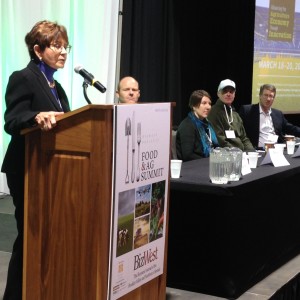Loveland seemed to be the perfect intersection of the natural and organic industry, with its deep roots in Boulder and Weld County, which is ranked among the nation’s top counties for traditional agriculture. And so, the Ranch events complex in Loveland hosted more than 100 people for the March 30 Food & Ag Summit, produced by BizWest Media.
The Food & Ag Summit focused on technology trends to cut costs for all producers and improve food quality so that food is more readily available, accessible and affordable.

A series of panel discussions covered a wide range of topics in the areas of:
- food safety
- nurturing the next generation of producers
- immigration reform and its impact on agriculture
- financing the future of agriculture
- global trade
- regenerative ag and the importance of soil conservation
- the latest technology trends
- genetically modified organisms
Advancing the issues
“The Food & Ag Summit is a natural followup to last year’s ‘Advancing the Agriculture Economy Through Innovation’ summit, which was held at Colorado State University and featured over 400 attendees,” said Kathay Rennels, associate vice president for the Office of Engagement and moderator of the panel on financing. “BizWest did a great job of showcasing and advancing the issues that emerged from our Ag Innovation Summit. The Office of Engagement was privileged to be part of the event, and honored that the summit highlighted the work of CSU researchers and faculty.”
CSU contributors to the summit included representatives from the College of Agricultural Sciences and Warner College of Natural Resources, and the Departments of Soil and Crop Sciences, Ecosystem Science and Sustainability, Agricultural and Resource Economics, and Animal Sciences.
The event also touched on some of the new and emerging trends in agriculture that impact both traditional production agriculture and the natural and organic food sectors, such as data-driven decision making, reduction of food waste and meeting an increased demand for food that is safe, secure and reasonably priced.